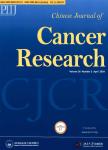TIME-AND DOSE-DEPENDENT UP-REGULATION OF TNF-α mRNA AFTER IRRADIATION OF HUMAN NSCLC CELL LINES IN VITRO
TIME- AND DOSE-DEPENDENT UP-REGULATION OF TNF-α mRNA AFTER IRRADIATION OF HUMAN NSCLC CELL LINES IN VITRO作者机构:Tumor Center Union Hospital Tongji Medical University Wuhan 430023 The Department of Radiotherapy Radiology Hospital Saarland University Homburg/Saar 66421 Germany
出 版 物:《Chinese Journal of Cancer Research》 (中国癌症研究(英文版))
年 卷 期:2006年第18卷第1期
页 面:19-25页
核心收录:
学科分类:1002[医学-临床医学] 100214[医学-肿瘤学] 10[医学]
基 金:This work was supported by a grant fromChina Scholarship Council (No.20842007)
主 题:Bronchial tumor cell lines (A549, NCI-H596) Tumor necrosis factor (TNF-α) Ionizing radiation
摘 要:Objective: Even though radiotherapy plays a major role in the local treatment of non-small cell lung cancer (NSCLC), little is known about the molecular effects of irradiation in this tumor. In the present study, we examined two NSCLC cell lines for their endogenous production of TNF-α after irradiation. To investigate the radiation-induced TNF-α production in NSCLC cell lines. Methods: Two human NSCLC cell lines (A549: squamous; NCI-H596: adenosquamous) were investigated for their TNF-α mRNA (real-time RT-PCR) after exposure to different irradiation doses (2, 5, 10, 20, 30, 40 Gy) and time intervals (1, 3, 6, 12, 24, 48 or 72 h). The TNF-α mRNA expression was quantified by real-time RT-PCR. The clonogenic survival was evaluated after irradiation with 2, 4, 6 and 8 Gy. Results: Non-irradiated NSCLC cells exhibited no or very low TNF-α expression. For the NCI-H596 cell line, TNF-α expression was significantly elevated 1~12 h (maximum 6h: 568fold increase relative to unirradiated cells) in a time-dependent manner. The radiation-induced increase could be observed after irradiation with 2 Gy reaching maximal at 40 Gy, with 83 times higher than normal controls. The clonogenic survival of these cell lines was nearly identical. Conclusion: NCI-H596 cells produce significant quantities of TNF-α following irradiation in a time- and dose-dependent manner. The pro-inflammatory cytokine TNF-α is a key mediator for the pathogenesis of radiation pneumonitis. Radiation-induced endogenous TNF-α expression in NSCLC cells may affect the normal lung adjacent to the tumor and may be associated with an adverse clinical outcome of the patient.



